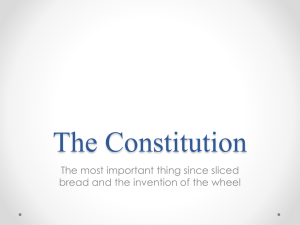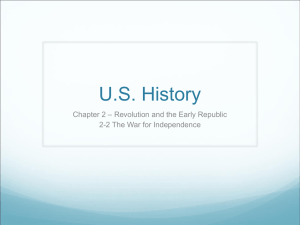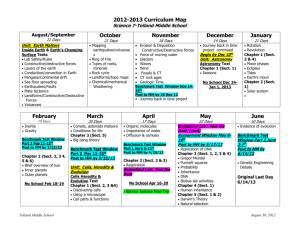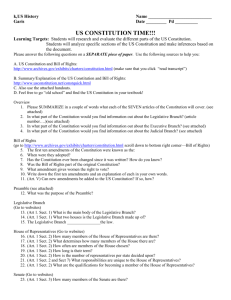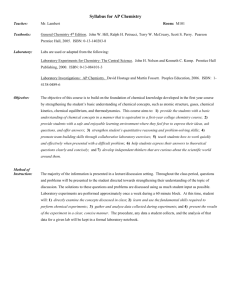US History Unit 2 OUTLINE
advertisement
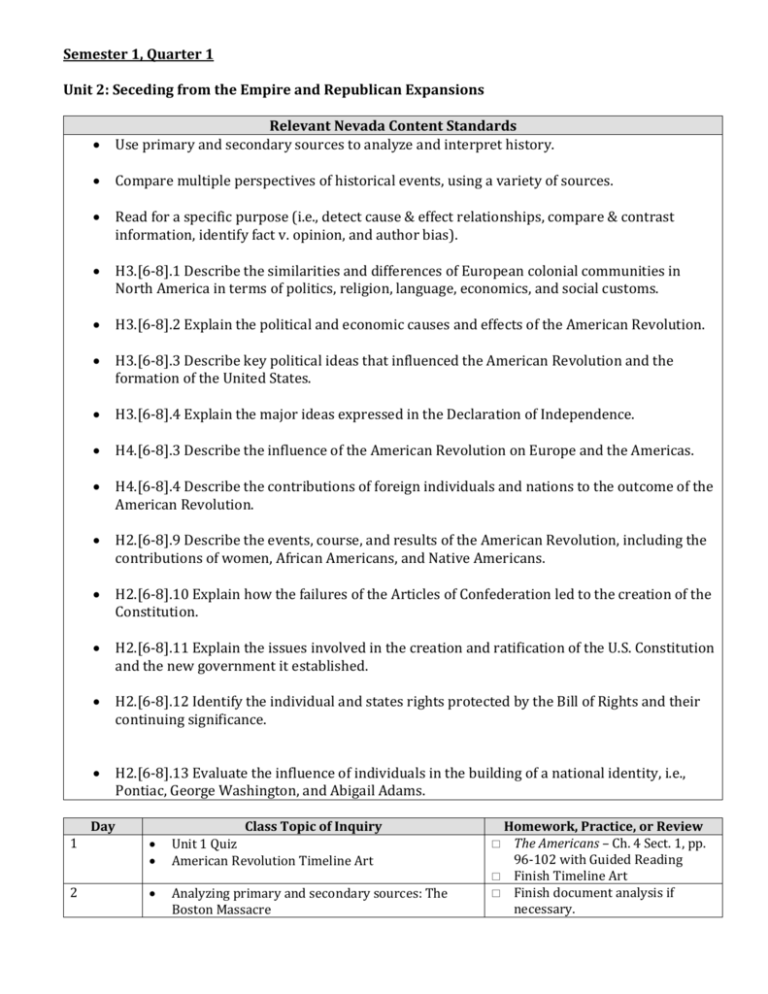
Semester 1, Quarter 1 Unit 2: Seceding from the Empire and Republican Expansions Relevant Nevada Content Standards Use primary and secondary sources to analyze and interpret history. Compare multiple perspectives of historical events, using a variety of sources. Read for a specific purpose (i.e., detect cause & effect relationships, compare & contrast information, identify fact v. opinion, and author bias). H3.[6-8].1 Describe the similarities and differences of European colonial communities in North America in terms of politics, religion, language, economics, and social customs. H3.[6-8].2 Explain the political and economic causes and effects of the American Revolution. H3.[6-8].3 Describe key political ideas that influenced the American Revolution and the formation of the United States. H3.[6-8].4 Explain the major ideas expressed in the Declaration of Independence. H4.[6-8].3 Describe the influence of the American Revolution on Europe and the Americas. H4.[6-8].4 Describe the contributions of foreign individuals and nations to the outcome of the American Revolution. H2.[6-8].9 Describe the events, course, and results of the American Revolution, including the contributions of women, African Americans, and Native Americans. H2.[6-8].10 Explain how the failures of the Articles of Confederation led to the creation of the Constitution. H2.[6-8].11 Explain the issues involved in the creation and ratification of the U.S. Constitution and the new government it established. H2.[6-8].12 Identify the individual and states rights protected by the Bill of Rights and their continuing significance. H2.[6-8].13 Evaluate the influence of individuals in the building of a national identity, i.e., Pontiac, George Washington, and Abigail Adams. Day Class Topic of Inquiry 1 Unit 1 Quiz American Revolution Timeline Art 2 Analyzing primary and secondary sources: The Boston Massacre Homework, Practice, or Review The Americans – Ch. 4 Sect. 1, pp. 96-102 with Guided Reading Finish Timeline Art Finish document analysis if necessary. 3 4 Analyzing the Declaration of Independence - the Claims, Evidence and Reasoning of Thomas Jefferson Analyzing the Declaration of Independence, cont. Analyzing the Declaration of Independence, cont. 5 6 7 8 9 Ranking Events as Evidence: Which 5 events were the proximate cause of the American Revolution? Document Analysis and Analytical Categorization of Evidence – How revolutionary was the American Revolution? How revolutionary was the American Revolution? Cont. Writing Claims - Practice The Articles of Confederation 10 The Constitutional Convention Writing Claims- Practice 11 Ratification Debates Writing Claims - Practice Ratification Debates, Cont. Writing Claims – Formative Assessment 13 14 15 The Constitution of the United States – Framework Analysis The Constitution, cont. Writing Claims and Analytical Categorization – Formative Assessment The Bill of Rights 16 12 Quiz Corrections Due The Americans – Ch. 4 Sect. 3, pp. 113-117 AND Ch. 4 Sect. 4, pp.118-123 with Guided Readings Finish document analysis if necessary. The Americans – Ch. 5 Sect. 1, pp. 132-137 with Guided Reading The Americans – Ch. 5 Sect. 2, pp. 140-144 with Guided Reading The Americans – Ch. 5 Sect.3, pp. 145-149 with Guided Reading Writing Claims – Review The Americans – pp. 152-153 with Notes Prepare for Summative Assessment Summative Assessment – Document Categorization, Writing Claims, American Revolution, Early National Period and the Constitution. Analysis Claims Evidence Analysis & Reasoning Stamp Act Boston Massacre Common Sense Thomas Jefferson Federalist/Anti-Federalist Shay’s Rebellion James Madison Bill of Rights ASSESSMENTS: The Americans – Ch. 4 Sect. 2, pp. 103-108 with Guided Reading Key Unit Concepts and Vocabulary Articles of Confederation Constitution Legislative, Executive, Judicial Branches Article Amendment Ratification Federalist papers Checks and Balances Republic Electoral College

